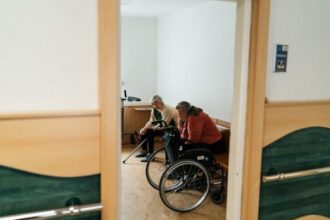For many individuals with dementia and their caregivers facilitating home living, navigating mealtime can prove to be a complex task rather than a simple daily routine.
The domestic setting introduces a series of obstacles for the person with dementia and the caregivers involved. These challenges range from confusion and functional impairments associated with dementia to the insufficient support available to friends and family members unexpectedly assuming caregiving responsibilities.
A pioneering study conducted by a team at Ohio State University has established the foundational steps towards developing a future intervention aimed at aiding caregivers in creating a secure and feasible mealtime schedule for dementia patients living at home.
The research highlights the numerous hurdles to patient participation in mealtime activities and draws on interviews with various healthcare professionals to outline methods for improving the dining experience. Recommendations include minimizing distractions, decluttering the eating area, utilizing visual aids, and drawing on resources from community nutrition programs like Meals-on-Wheels.
Lisa Juckett, the study’s lead author and an assistant professor of occupational therapy at The Ohio State University School of Health and Rehabilitation Sciences, emphasizes the importance of simplification in the mealtime environment. According to Juckett, the complexity of eating for individuals with dementia stems from multiple factors beyond mere forgetfulness, underlining the intricate nature of ensuring proper nutrition.
The research, recently published in The Gerontologist Journal, underscores the prevalence of dementia within the United States, with over 80% of those affected living at home. Many of these individuals face difficulty eating or preparing meals independently.
Juckett points out the growing older adult population and the anticipated increase in Alzheimer’s and related dementias, highlighting the strain this will place on the healthcare system and the increased responsibility on unpaid caregivers who desire to keep their loved ones at home.
The study acknowledges the efforts of organizations in offering training and support for home-based dementia care yet recognizes the potential for caregivers to feel too overwhelmed to engage with these resources. By interviewing 20 professionals from various disciplines involved in community-based dementia care, the study identifies key challenges to mealtime participation and recommends practical strategies to address them. These include reducing sensory distractions, decluttering living spaces, providing clear instructions, and optimizing the eating environment to suit the needs of individuals with dementia.
Additionally, the importance of community-based programs like Meals-on-Wheels is highlighted, not only for their direct benefit to those with dementia but also in offering caregivers much-needed support and relief.
The next phase of Juckett’s research involves gathering insights from caregivers and individuals with dementia to refine the intervention strategies further, with the ultimate goal of developing and testing an effective mealtime intervention for home settings.
This effort, supported by the National Institute on Aging’s IMPACT Collaboratory, signifies a significant step towards acknowledging and addressing the complexities of caregiving, particularly around mealtime routines, aiming to reduce the burden on caregivers and enhance the quality of life for individuals living with dementia at home.
The study’s co-authors include notable academics from Ohio State, the University of Wisconsin-Madison, and Brown University, showcasing a collaborative approach to tackling the challenges faced by those affected by dementia and their caregivers.
More information: Lisa A Juckett et al, Supporting mealtime participation among people living with dementia at home: Challenges and strategies for caregivers, The Gerontologist. DOI: 10.1093/geront/gnad167
Journal information: The Gerontologist Provided by Ohio State University








